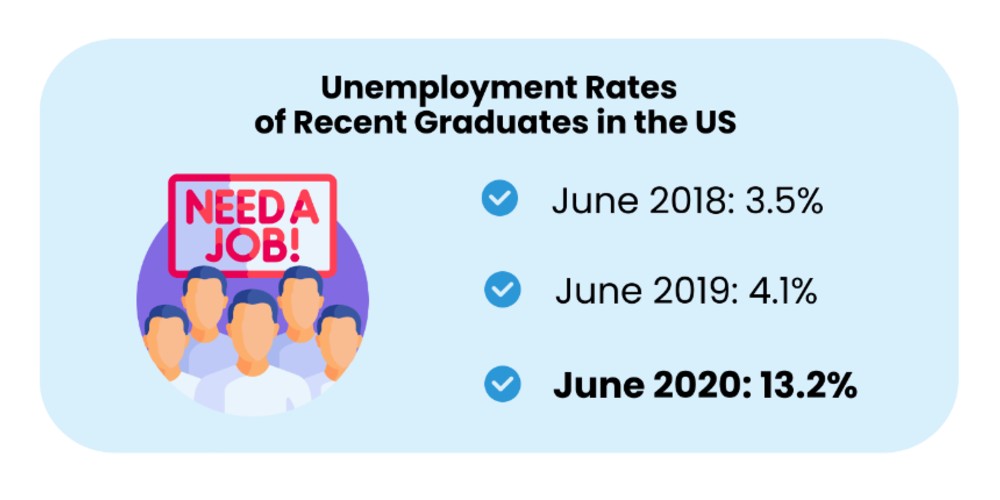If you are a current or soon-to-be graduate, you may be feeling uneasy about finding a job. This is the fear most commonly felt by students throughout their entire study process. The current economic conditions make this fear even stronger.
We’ve done some research to determine what aspects of job searching for recent graduates are worth worrying about. Below you will find facts and numbers we’ve put together for you. Spoiler alert: things are not that bad. Find some key college graduate employment statistics in this article by Custom Writing experts.

📈 College Grad Jobs in 2026: What’s New?
- According to The Atlantic, the labor market is especially brutal to young workers due to the pandemic.
- However, the research of 2019 made by the Bureau of Labor Statistics shows the opposite results. The unemployment rate is lower and the salaries are higher for the college grads than those without college degrees.
- 67% of hiring managers in the US reported that they are willing to hire recent college graduates during 2020. That went up from 65% the year before that – and it’s the best outlook since 2007. “More companies are looking to hire students straight out of college than any other time in almost a decade,” commented CareerBuilder’s CEO Matt Ferguson.
- A recent analysis has shown that the unemployment rate for recent graduates is lower than for the overall labor force.
- According to the new government projections, jobs that require a college degree will grow much faster than those that require a high school degree only over the next ten years.
- While most people with a high school degree work in those occupations that are potentially prone to automation, those with a college degree are less at risk of being replaced by robots.
🔥 College Graduate Jobs: Hot Career Options
While there is no doubt that the employment picture for grads is now looking brighter than ever, finding a first job may still be a challenge on an individual level.
Here’s why. Not only must recent graduates decide which jobs will give them the best opportunities to use their talents, capabilities, and previous experiences; they also need to find a position where a decent salary is combined with promising career prospects. Here’s some information on fields which are seeing the biggest demand for new specialists.
- While science and engineering majors seem to be getting the biggest salaries in the US market, business majors follow them closely and are also the most in demand. More than 75% of employers have business majors in the list of grads they would like to hire.
- According to 2020’s Emerging Careers Report by UC San Diego, the top 5 emerging careers for college graduates across the US are: software developers (projected growth in 2014–2024: 18.8%), accountants and auditors (10.7%), computer systems analysts (20.9%), medical and health services managers (16.9%), sales representatives in wholesale manufacturing/technical and scientific products (6.9%)
- The demand for software (applications) developers is expected to grow by 23% between 2015 and 2025, according to UCSD Hot Careers. This is faster than the average for all other occupations.
- For those who consider that choosing an employer is as important as the position itself, there is the Fortune ranking of the top workplaces for fresh college grads. The ranking takes into account a volume of job growth, and recruiting and hiring numbers. Quick fact: probably the most desired employer in the world – Google – took only the #17 spot in this ranking.
💸 College Grad Jobs: Starting Salaries
It’s probably not worth it to base your career decisions purely on how much money you’re likely to make. And yet the financial factor is a rather significant one and has to be taken into account when choosing a future job. That’s why we’ve also put together some facts and numbers regarding the earning potential behind some different career paths.
- According to CareerBuilder Survey, the overall good news is that 37% of employers were planning to offer recent college graduates higher pay in 2029 than in 2019.
- The same survey showed that 27% of employers hiring recent college graduates in 2019 intended to pay a starting salary of $50,000 or more.
- Although the salaries were increasing overall, the STEM majors are still making consistently more than their humanities peers. The average 2020’s engineer graduate is expected to earn $64,891, and petroleum engineers were estimated to make an average of $80,600 in their first year out of college, according to 2019 data.
- The highest-paying bachelor’s degrees, according to the PayScale college salary report, are as follows:
- petroleum engineering (early career pay $96,700)
- systems engineering (early career pay $66,400)
- actuarial science (early career pay $60,800)
- chemical engineering (early career pay $69,800)
- computer science & engineering (early career pay $71,200)
- Among humanitarian degree holders, those with a history major seem to perform the best. In an attorney/lawyer position, they get a mid-career pay of $159,000, on average.
- The second-best paying humanitarian major is English Literature (or Language & Literature). By the middle of their career, graduates holding this degree make $92,200 as editorial directors, $91,200 as exclusive editors, and $90,500 as content strategists.
- An English major is the most common degree held among those who studied humanities. It doesn’t rank the highest, but college graduates with an English major who are between the ages of 25 and 59 make an average of $53,000, which is $17,000 more a year compared to those with only a high school degree, and only $8,000 less a year than an average salary across all college degrees.
While the numbers above may make it a little more clear when it comes to what to expect, bear in mind that those are average numbers, which means there is always a chance that you’ll be an outlier. There are countless factors – first of all, your own abilities and effort, your personal connections, and your determination – that will contribute to how much cash you’ll be bringing home at the end of the day.
🍀 College Grad Labor Market: Unemployment Rates
We’re used to thinking that it’s a struggle for recent graduates to find a job. In fact, ending up without any job at all is really not very likely anymore. In the US, the unemployment rate for graduates is around 10%.
- According to Statista, more than 13% of recent college graduates were unemployed in May 2020. This is three times more than a year before.
- Many students and recent grads lost their jobs in summer 2020 due to the pandemic.
- In the UK, nearly 40% of graduates are still looking for a job half a year after graduation, and a quarter remain unemployed after a whole year, as highlighted by The Telegraph.
🚀 How to Be Competitive in the Labor Market
One of the key reasons for fresh grads not getting their dream job may be that, while they believe they are prepared for the job, their potential employers do not share this belief. There is statistical evidence of the dissonance between employers’ ideas around what is a well-prepared candidate versus that of job seekers.
- A study from the Association of American Colleges and Universities showed that, quoting Forbes, “new graduates are more than twice as likely as employers to think of themselves as well-prepared, especially in soft skills like communication, creativity and critical thinking”.
- The CareerBuilder’s survey, which included more than 2,000 hiring managers and human resource professionals, showed that nearly a quarter (24%) of employers do not feel that academic institutions are giving the students adequate preparation for jobs available within their organizations. Out of those, 47% pointed out the problem that book learning prevailed over real-world learning. 39% wanted to see a candidate who has both technical skills and those gained from liberal arts. 25% said that entry-level roles in their organizations became more complex for recent graduates to handle.
- 44% of fresh college graduates are willing to be employed by either a medium-sized business or a small business/start-up.
- When asked about which skills college graduates lack the most, US employers cited interpersonal skills (52%), problem-solving skills (48%), leadership (42%), teamwork (39%), written and oral communication (37%), and creative thinking (35%).
- Employers in the UK and India have a similar enough opinion, pointing out that recent graduates have a lack of interpersonal skills (49% in the UK, and 50% in India), problem-solving skills (40% UK, 60% India), and creative thinking (39% UK, 56% India).
- The Association of American Colleges & Universities found during a recent survey that most employers value the knowledge of human cultures and the physical world, in particular understanding democratic institutions and values (87%), broad knowledge in the liberal arts and sciences (78%), and understanding of cultures and societies outside the US (78%).
- 91% of employers agree that for career success, “a candidate’s demonstrated capacity to think critically, communicate clearly, and solve complex problems is more important than his or her undergraduate major”.
If you are right now struggling through those tough college or uni years, remember that you are doing it for a good reason. You’re creating better possible outcomes for your future self in the labor market. Which is, of course, not the sole purpose of higher education: no matter what, you’re gaining the priceless skills of critical thinking and intellectual curiosity, which will assist you in every endeavor throughout your life.



![Internship Essay: Example & Complete Writing Guide [2026]](https://custom-writing.org/blog/wp-content/uploads/2020/12/internship-student-e1565190155561-284x153.jpg)


![3 Scholarship Essay Examples about Yourself [2026]](https://custom-writing.org/blog/wp-content/uploads/2020/12/closeup-hand-student-holding-pencil-284x153.jpg)





Thanks a lot for the helpful information!